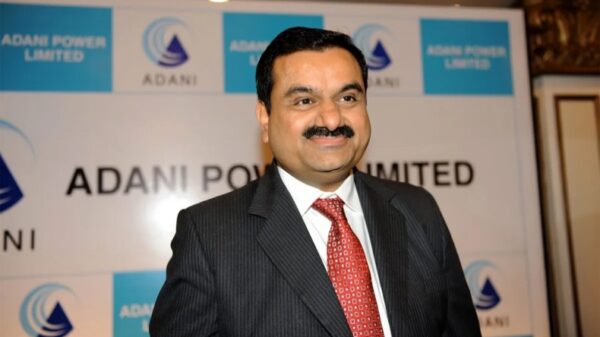
Without settling the controversies over the power purchase agreement with the Adani Group of India, the Bangladesh government on Thursday announced the beginning of test power transmission at the group’s Godda power plant in Jharkhand state since the day for exclusively supplying the electricity to Bangladesh.
Bangladesh has also started receiving about 50 MW from the plant since Thursday, said government officials.
The import of electricity from the Adani plant began amid a popular demand for scrapping the power purchase deal.
The test transmission has generated new controversies over the power plant as Bangladesh’s Power Development Board document shows that the plant has been in test transmission since the middle of December 2022.
A power plant should run test transmission for at least 90 days before becoming fully operational, Bangladesh power officials said, adding that the test transmission could extend up to 120 days.
The power ministry of Bangladesh issued a press release on Thursday announcing that the 1,600MW Godda power plant began its test transmission, supplying more or less 50 MW to the country.
‘We will be in need of more power in summer and may need to get 750 MW from the Adani plant once it is fully operational,’ said SM Wazed Ali Sarder, member, generation, PDB.
The Godda power plant has completed the first of its two units — each having 800MW capacity — while the construction of the second unit is in progress, he said
Wazed was the lone official in the PDB high-up, who answered calls made to them over their phones.
He, however, could not say whether Indian corporate giant Adani and the PDB had reached an agreement over the controversial power purchase deal, which energy experts have already dubbed highly discriminatory to Bangladesh.
The power purchase deal, with its numerous provisions, raised eyebrows over extending undue financial benefits to the Adani Group.
The power purchase agreement allows Adani, currently embroiled in a controversy over fraud, to manipulate coal prices, according to PDB officials.
Adani sought a 60 per cent higher price than charged by similar coal-based power plants, because of a controversial provision allowing higher prices for lower-quality coal.
The PDB also wanted to negotiate coal prices with power producers based on coal prices in the country of import.
Media reports, citing documents, also revealed that Adani concealed from Bangladesh the fact that India exempted it from almost all import taxes for the Godda power plant so that Adani could realise a higher capacity charge in breach of the power purchase deal.
Section 13.1(e) of the power purchase agreement signed with Adani required it to inform the Bangladesh Power Development Board of changes in tax and VAT rates within 30 days of any such change occurring.
Since the Godda power plant became a special economic zone on February 25, 2019, Adani has imported machinery and equipment almost without any taxes and would not have to pay taxes for importing coal.
Adani Power Limited has not yet informed the PDB of the facts about its exemption from taxes or duties.
The Indian government modified its Special Economic Zone regulations in February 2019 to give the Godda power plant the benefits of a tax-free zone on the grounds of promoting energy exports, as reported by The Washington Post on December 9, 2022.
The Washington Post in a report calculated that Adani would save $35 million a year on its coal
imports for the Godda plant because of the tax exemptions. Usually, the coal import tax is 400 rupees, or about $5, a tonne.
Officials of the power ministry of Bangladesh stated that they would not pay any taxes if Adani did not pay them.
The capacity charge includes investment costs, VAT and taxes, and other dues. The absence of a usual provision for discount on energy prices in the power purchase agreement between Bangladesh and Adani is also estimated to make the Indian corporate giant an extra income between $1.5 million and $66 million every month if the Godda plant operated at a 85 per cent capacity over its 25-year lifetime.
In other major deals, the PDB is entitled to a 45 per cent discount on coal price if it reaches $115 a tonne. The coal price discount provision takes effect when a tonne of coal is bought at $55.
As a result of no coal-price-discount provision, in the best-case scenario for Bangladesh, when a tonne of coal would be bought at $55, the power purchase deal would earn Adani an additional income of $15,50,539 every month, according to the PDB calculations.
A PDB assessment in 2022 revealed that the average per-unit electricity production cost at the Godda power plant would be over Tk 24, about 32 per cent higher compared to the electricity produced at the Payra power plant, another coal-based thermal power plant.
‘How can test transmission and power import begin with so many problems unresolved?’ wondered Hasan Mehedi, member-secretary, Bangladesh Working Group on External Debt.
‘And what is the need for starting the test transmission for the second time?’ he also asked.